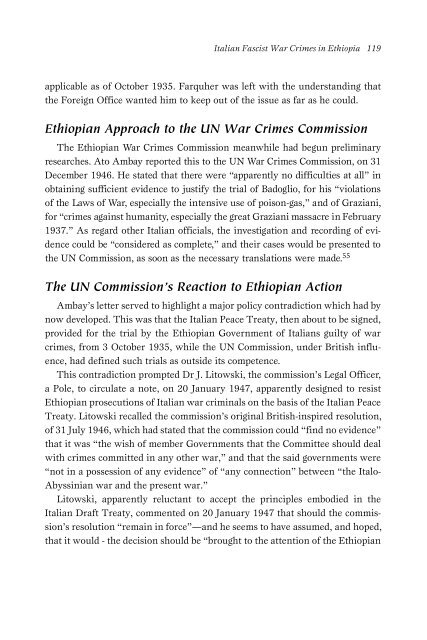Italian Fascist War Crimes in Ethiopia - Societa italiana di storia ...
Italian Fascist War Crimes in Ethiopia - Societa italiana di storia ...
Italian Fascist War Crimes in Ethiopia - Societa italiana di storia ...
Create successful ePaper yourself
Turn your PDF publications into a flip-book with our unique Google optimized e-Paper software.
<strong>Italian</strong> <strong>Fascist</strong> <strong>War</strong> <strong>Crimes</strong> <strong>in</strong> <strong>Ethiopia</strong> 119<br />
applicable as of October 1935. Farquher was left with the understand<strong>in</strong>g that<br />
the Foreign Office wanted him to keep out of the issue as far as he could.<br />
<strong>Ethiopia</strong>n Approach to the UN <strong>War</strong> <strong>Crimes</strong> Commission<br />
The <strong>Ethiopia</strong>n <strong>War</strong> <strong>Crimes</strong> Commission meanwhile had begun pre l i m i n a r y<br />
re s e a rches. Ato Ambay reported this to the UN <strong>War</strong> <strong>Crimes</strong> Commission, on 31<br />
December 1946. He stated that there we re “a p p a rently no <strong>di</strong>fficulties at all” <strong>in</strong><br />
obta<strong>in</strong><strong>in</strong>g sufficient evidence to justify the trial of Badoglio, for his “violations<br />
of the Laws of Wa r, especially the <strong>in</strong>tensive use of poison-gas,” and of Gra z i a n i ,<br />
for “crimes aga<strong>in</strong>st humanity, especially the great Graziani massacre <strong>in</strong> Fe b r u a r y<br />
1937.” As re g a rd other <strong>Italian</strong> officials, the <strong>in</strong>vestigation and re c o rd<strong>in</strong>g of ev i-<br />
dence could be “c o n s i d e red as complete,” and their cases would be presented to<br />
the UN Commission, as soon as the necessary translations we re made. 5 5<br />
The UN Commission’s Reaction to <strong>Ethiopia</strong>n Action<br />
Ambay’s letter served to highlight a major policy contra<strong>di</strong>ction which had by<br />
now developed. This was that the <strong>Italian</strong> Peace Treaty, then about to be signed,<br />
provided for the trial by the <strong>Ethiopia</strong>n Government of <strong>Italian</strong>s guilty of war<br />
crimes, from 3 October 1935, while the UN Commission, under British <strong>in</strong>fluence,<br />
had def<strong>in</strong>ed such trials as outside its competence.<br />
This contra<strong>di</strong>ction prompted Dr J. Litowski, the commission’s Legal Officer,<br />
a Pole, to circulate a note, on 20 January 1947, apparently designed to resist<br />
<strong>Ethiopia</strong>n prosecutions of <strong>Italian</strong> war crim<strong>in</strong>als on the basis of the <strong>Italian</strong> Peace<br />
Treaty. Litowski recalled the commission’s orig<strong>in</strong>al British-<strong>in</strong>spired resolution,<br />
of 31 July 1946, which had stated that the commission could “f<strong>in</strong>d no evidence”<br />
that it was “the wish of member Governments that the Committee should deal<br />
with crimes committed <strong>in</strong> any other war,” and that the said governments were<br />
“not <strong>in</strong> a possession of any evidence” of “any connection” between “the Italo-<br />
Abyss<strong>in</strong>ian war and the present war.”<br />
Litowski, apparently reluctant to accept the pr<strong>in</strong>ciples embo<strong>di</strong>ed <strong>in</strong> the<br />
<strong>Italian</strong> Draft Treaty, commented on 20 January 1947 that should the commission’s<br />
resolution “rema<strong>in</strong> <strong>in</strong> force”—and he seems to have assumed, and hoped,<br />
that it would - the decision should be “brought to the attention of the <strong>Ethiopia</strong>n

















